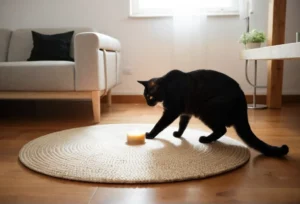Cats have a reputation for being fearless and brave creatures, often displaying a confidence that many of us envy. But why exactly are cats so brave? Let’s explore the fascinating reasons behind their courageous behavior.
Natural Instincts
Cats are known for their bravery in various situations, but have you ever wondered why they display such courage? One key factor lies in their natural instincts. Cats are territorial animals by nature, and this innate instinct drives them to protect their territory and assert their dominance when faced with potential threats. This territorial behavior can manifest as acts of bravery when a cat feels its space is being encroached upon or when it senses danger lurking nearby. Additionally, cats are masters of adaptation. Their agile and nimble nature allows them to respond quickly to challenging situations, showcasing their bravery in the face of adversity.
Survival Skills
One fascinating aspect that contributes to a cat’s brave demeanor is its background as a predator in the wild. Hunting is a primal instinct deeply ingrained in cats, and this predatory behavior translates into courage and fearlessness in domestic settings. Cats’ sharp instincts, keen senses, and stealthy movements enable them to navigate various environments with confidence and poise, demonstrating their bravery when confronted with unfamiliar or potentially dangerous situations. Their survival skills honed in the wild empower them to face challenges head-on and emerge victorious, showcasing their innate courage.
Unique Insight : Interestingly, a cat’s bravery is also tied to its sensitive nature. Cats have a heightened sense of awareness and acute perception, allowing them to assess risks and make split-second decisions when necessary. This intuitive ability to read situations and respond accordingly contributes to their reputation for bravery in the face of uncertainty.
Curiosity and Exploration
Cats are known for their keen curiosity and love for exploring their surroundings. This natural curiosity drives them to investigate new places, objects, and situations, which can lead to acts of bravery. When a cat encounters something unfamiliar, its inquisitive nature compels it to approach rather than retreat. This boldness in the face of the unknown is a key factor in why cats are often perceived as brave creatures.
Benefits of Curiosity: 1. Mental Stimulation: By constantly seeking out new experiences, cats keep their minds sharp and engaged. 2. Confidence Building: Successfully navigating novel situations boosts a cat’s self-assurance and courage. 3. Adaptability: Curious cats are better equipped to handle unexpected challenges and changes in their environment.
Independence
The independent nature of cats plays a significant role in their ability to show bravery. Unlike dogs, which often rely on their owners for comfort and reassurance, cats are more self-reliant and less affected by external influences. This independence allows them to approach challenges with a sense of confidence and autonomy, even in potentially risky situations.
Cats’ independence gives them a sense of control over their lives, reducing fear and increasing their willingness to take risks. This self-assuredness enables them to face adversity head-on, demonstrating acts of bravery that might surprise their human companions.
Unique Insight: Cats’ independent nature not only fosters bravery but also teaches us the importance of self-reliance and confidence in overcoming obstacles in life. By observing and learning from our feline friends, we can cultivate our own courage and resilience in the face of adversity.
Social Hierarchy
Cats are known for their independence, but their social hierarchy plays a crucial role in shaping their behavior. In the wild, cats establish a hierarchy within their colonies, with dominant individuals taking charge. This social structure influences domestic cats as well, affecting their confidence and perceived bravery. A cat who feels secure in its position within the hierarchy is more likely to exhibit bold behavior, taking risks and facing challenges head-on.
Protective Instincts
Cats may seem fearless at times, but much of their perceived bravery stems from their innate protective instincts. Cats have a strong desire to defend themselves and those they care about, whether it’s their territory, their human family, or even other animals in the household. This protective nature drives them to confront threats with courage and determination, often putting themselves in harm’s way to ensure the safety of their loved ones.
Additional Insight: Signs of Fear
While cats may display brave behavior, it’s essential to recognize the signs of fear as well. Common signs of fear in cats include flattened ears, dilated pupils, and a tucked tail. Understanding these signals can help you decipher your cat’s emotions and provide support when they feel vulnerable or anxious. By acknowledging their fears and offering reassurance, you can help your cat feel safe and secure in their environment.
Adaptability
Cats are known for their remarkable adaptability, which plays a significant role in their perceived bravery. Their ability to quickly adjust to new environments and situations allows them to face challenges head-on without hesitation. Whether it’s exploring unfamiliar territories or encountering new objects, cats can adapt swiftly, showcasing their courage in the face of the unknown.
Their agile nature and keen sense of curiosity enable them to navigate through different scenarios confidently. This adaptability also extends to their hunting instincts, where they fearlessly pursue prey with precision and determination. By being able to adapt to various circumstances effortlessly, cats demonstrate a sense of fearlessness that often surprises and impresses their human companions.
In essence, a cat’s adaptability is a key factor in why they are perceived as brave animals. Their innate ability to thrive in diverse environments and overcome obstacles showcases their resilience and courage in the face of uncertainty. So next time you witness your cat fearlessly exploring a new space, remember that it’s their remarkable adaptability that fuels their bravery.
Trust and Bonding
The trust and bond between a cat and its human companion play a vital role in influencing the feline’s willingness to face fears. When a cat feels safe and secure in its relationship with its owner, it is more likely to exhibit brave behavior in uncertain situations. This trust is built over time through positive interactions, affection, and a sense of security that the cat feels in the presence of its human.
Establishing a strong bond with your cat through consistent care, attention, and love can significantly impact its confidence levels. When a cat knows it has a reliable and supportive human by its side, it feels empowered to confront challenges and fears with courage. This deep connection creates a sense of security for the cat, allowing it to push past its boundaries and exhibit acts of bravery.
By fostering a trusting and loving relationship with your feline companion, you can encourage and support their brave behavior. Remember, a cat that feels loved and safe is more likely to face fears head-on, showcasing its innate courage and determination. So invest time in building a strong bond with your cat to witness its true bravery shine through.
Fun Facts About Brave Cats
Did you know that a cat named Scarlett once saved her kittens from a burning building in New York City? This incredible feline made multiple trips into the fire to rescue each of her babies, proving that bravery knows no bounds when it comes to protecting loved ones. Cats like Scarlett remind us of the powerful instinctual drive they have to shield their families from harm, showcasing their extraordinary courage in the face of danger.
Another famous cat, Simon, was a ship’s cat during World War II. He bravely protected the crew from a rat infestation onboard the HMS Amethyst, even surviving severe injuries during a bombardment. This fearless feline’s loyalty and determination earned him the Dickin Medal, a prestigious award for animal bravery in wartime. Simon’s story highlights the unwavering courage that cats can exhibit in extreme circumstances.
As we learn about these remarkable feats of bravery displayed by cats like Scarlett and Simon, we start to understand the depth of their fearless nature. Whether it’s protecting their young, defending their territory, or facing unexpected challenges, cats demonstrate a level of bravery that is both inspiring and humbling. Their innate courage serves as a powerful reminder of the incredible bond between humans and animals, forever woven together by acts of fearless heroism.
Why Cats Are Naturally Brave
1. Instinctual Survival Skills: Cats have a strong instinct for survival, honed over thousands of years of evolution. This innate drive helps them navigate challenging situations with a sense of fearlessness, allowing them to face obstacles head-on and emerge victorious.
2. Superior Agility and Reflexes: With their lightning-fast reflexes and incredible agility, cats are able to react swiftly to potential threats or dangers. This physical prowess, combined with sharp senses, enables them to assess risks quickly and make split-second decisions in the face of danger.
3. Independent Nature: Cats are known for their independent spirits, which can translate into a fearless attitude when confronted with adversity. Their self-reliance and confidence give them the courage to take on unfamiliar or intimidating situations without backing down.
4. Strong Bonds with Humans: Cats form strong bonds with their human companions, often viewing them as part of their family. This deep connection can inspire cats to display acts of bravery to protect their loved ones, showing unwavering loyalty and devotion in times of need.
5. Adaptability: Cats are highly adaptable creatures, able to adjust to new environments and challenges with ease. This adaptability gives them the resilience to confront unfamiliar or potentially dangerous circumstances without hesitation, relying on their instincts and natural abilities to overcome obstacles.
In conclusion, cats exhibit bravery in a variety of ways, from protecting their families to facing down threats with unwavering courage. Their natural instincts, physical capabilities, independence, strong bonds with humans, and adaptability all play a role in shaping their fearless nature. By understanding the unique qualities that make cats inherently brave, we can appreciate and admire these extraordinary animals even more.
Alex, a passionate animal lover, has experience in training and understanding animal behavior. As a proud pet parent to two dogs and three cats, he founded AnimalReport.net to share insights from animal experts and expand his knowledge of the animal kingdom.




